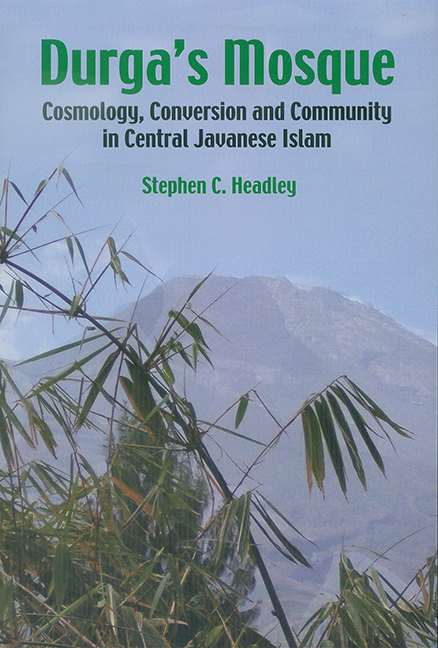Book contents
- Frontmatter
- Contents
- List of Figures
- List of Tables
- Preface
- Acknowledgements
- Introduction: Cosmology, Conversion and Community in Javanese Islam
- PART I THE SOCIOLOGY AND PRACTICE OF RELIGION IN CENTRAL JAVA
- PART II RECONSTRUCTION OF LOCAL RELIGIOUS HISTORY
- PART III INVOKING THE COSMOS, MAGNIFYING ALLAH: STRUCTURING A LANDSCAPE IN THE SEVENTEENTH TO NINETEENTH CENTURIES
- PART IV COSMOLOGY, CONVERSION AND COMMUNITY IN CENTRAL JAVANESE ISLAM TODAY
- 12 Jihad in Java: An Islamic Appropriation of Individualism
- 13 Of Sacred Wells and Shopping Malls: Glimpses of the Reconstruction of Social Confidence in Solo after Soeharto
- 14 The Social Reconstruction of Confidence: Community and Islam in Surakarta Today
- 15 Enclosing Cosmologies and Elective Citizenship
- Bibliography
- Index
- About the Author
14 - The Social Reconstruction of Confidence: Community and Islam in Surakarta Today
from PART IV - COSMOLOGY, CONVERSION AND COMMUNITY IN CENTRAL JAVANESE ISLAM TODAY
Published online by Cambridge University Press: 21 October 2015
- Frontmatter
- Contents
- List of Figures
- List of Tables
- Preface
- Acknowledgements
- Introduction: Cosmology, Conversion and Community in Javanese Islam
- PART I THE SOCIOLOGY AND PRACTICE OF RELIGION IN CENTRAL JAVA
- PART II RECONSTRUCTION OF LOCAL RELIGIOUS HISTORY
- PART III INVOKING THE COSMOS, MAGNIFYING ALLAH: STRUCTURING A LANDSCAPE IN THE SEVENTEENTH TO NINETEENTH CENTURIES
- PART IV COSMOLOGY, CONVERSION AND COMMUNITY IN CENTRAL JAVANESE ISLAM TODAY
- 12 Jihad in Java: An Islamic Appropriation of Individualism
- 13 Of Sacred Wells and Shopping Malls: Glimpses of the Reconstruction of Social Confidence in Solo after Soeharto
- 14 The Social Reconstruction of Confidence: Community and Islam in Surakarta Today
- 15 Enclosing Cosmologies and Elective Citizenship
- Bibliography
- Index
- About the Author
Summary
THE UMAT‘S APPROPRIATION OF MODERNITY
In the introduction to this volume, we justified the need for an anthropological study of the nineteenth century Central Javanese umat by invoking the historical contrast opposing enveloping cosmologies to elective citizenship. We claimed that any effort to understand the appropriation of modernity by the umat of Javanese Muslims would need to take that route. Their community's morphology could only be grasped through a study of its changing forms. More fundamentally, one could only decide what kind of community the umat is by investigating to what extent it is encompassed. Our starting point was the attempt to show how the Javanese Islam had become the higher value by representing that society towards the exterior world, while vis-à-vis the older insular orientation of this island, the values of “Javanism” have remained primordial to this day. In this chapter their interface will be explored; the processes that led to this inversion of their value helps explain the emergence of communalism in the period after the fall of the Soeharto dictatorship (May 1998). Using contemporary data, it is no longer possible to confine ourselves to material from the village of Krendawahana and the area of Kaliasa, for the village has become “sub-urban”, or as its villagers say wis kota, and at the sociological level, the village has in some respects been assimilated to that of the urban neighbourhood (kampung). The village that used to lie on the northern frontier of the Mangkunagaran kingdom, now lies at the northern limit of the industrial influence of the city of Surakarta with its population of more than half a million people. Taking the framework of the greater (raya) Surakarta into which Kaliasa now belongs has the advantage of giving greater scope to the conclusions of our earlier chapters. As the revival of Islam in the 1980s moved from the city to the countryside using techniques of popular preaching (dakwah) it was no longer a question of the Islamization (Islamisasi) of the countryside but of the indigenization of a pure Islam (pribumisasi Islam murni), where “pure” was defined by urban Muslim values. And it was in this same urban milieu that after the fall of Soeharto in May of 1998, that a power vacuum was created into which the new reformers of the Javanese village communities rushed. It is to these that we now turn.
- Type
- Chapter
- Information
- Durga's MosqueCosmology, Conversion and Community in Central Javanese Islam, pp. 474 - 513Publisher: ISEAS–Yusof Ishak InstitutePrint publication year: 2004



